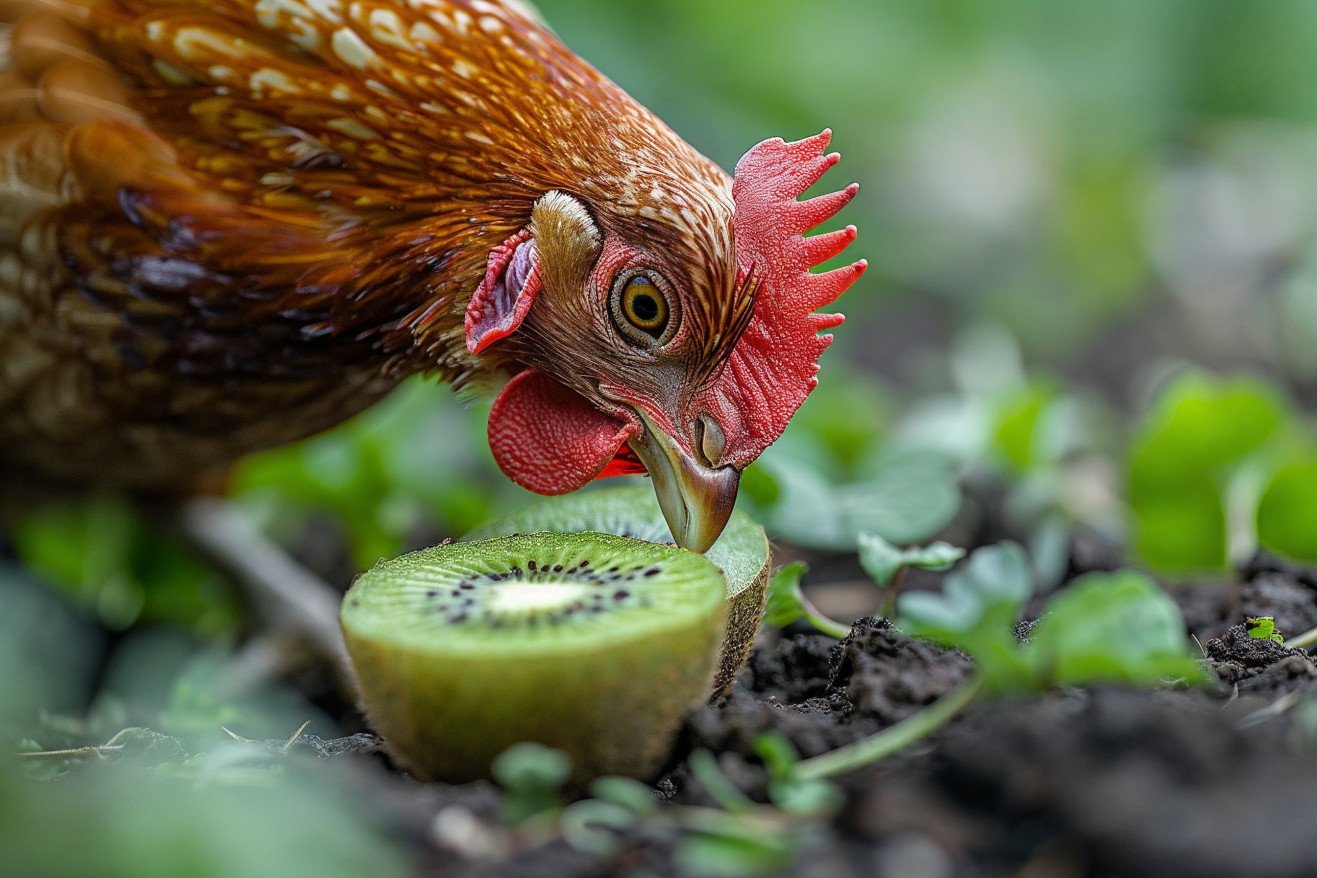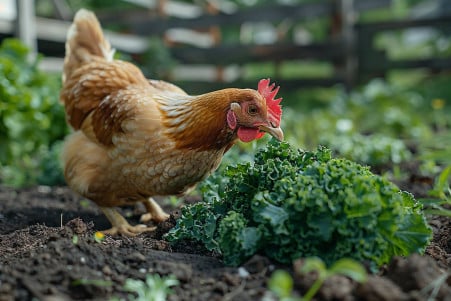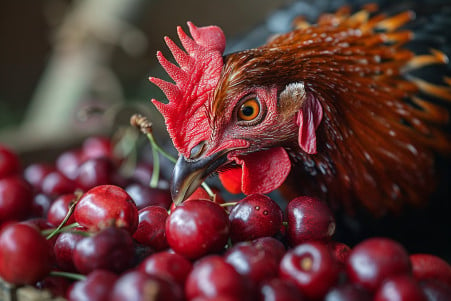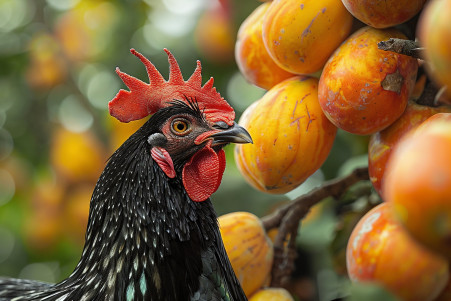Can Chickens Eat Kiwi? Feeding Guidelines and Nutritional Benefits
17 February 2024 • Updated 16 February 2024

Kiwi is a fruit that is packed with vitamins, and while you may be reaping the rewards of this superfruit, can your chickens enjoy it too? Chickens can eat kiwi, and that includes the skin and the seeds. However, it should be fed to them in moderation.
In fact, it should make up no more than 10% of their diet, and it’s best to feed it to them as a treat no more than twice a week to avoid giving them too much sugar.
This article will delve into a number of agricultural and veterinary journals to help you understand the nuanced relationship between chickens and their diets, specifically when it comes to feeding them fruits like kiwi.
We’ll look at what chickens need nutritionally, the pros and cons of feeding them tropical fruits, and how much you should feed them to keep them healthy. By the end of this article, you’ll know exactly how kiwi can be incorporated into a chicken’s healthy diet.
Can chickens eat kiwi?
What Do Chickens Eat? The Basics and the Fun Stuff
To maintain good health and high egg production, chickens need to have their nutritional needs met. The Merck Veterinary Manual notes that chickens need a minimum of 38 dietary nutrients, including essential amino acids, vitamins, and minerals, in specific concentrations and ratios.
Poultry will adjust their food consumption to meet their daily energy requirements, which can change based on factors like how much they’re laying and the weather, according to Dr. Jacquie Jacob at the University of Kentucky.
To make sure that chickens have a well-balanced diet, it’s important to make sure that each type of feed contributes to the overall nutritional profile, rather than just feeding chickens a variety of different things. Fruits can help with this by providing a variety of nutrients. For example, kiwi can give chickens antioxidants and enzymes that they may not get from their regular feed.
While kiwi and other fruits aren’t a staple of a poultry diet, they can help to supplement it by providing variety and essential non-nutrient components that can help to promote overall health, according to The Nutrient Requirements of Poultry from the National Academies Press.
When you look at the specific health effects of kiwi on chickens, it’s easy to see that when it’s fed in the right way, it can be more than just a fun treat for chickens—it can be a valuable addition to their regular diet.
Kiwi: A Nutrient-Rich Superfood for Chicken Nutrition
Kiwi is not only a superfood for people but also for chickens, thanks to its rich nutrient profile. According to the USDA National Nutrient Database, kiwi is an excellent source of vitamin C, which is important for supporting the general health and immune function of chickens. Kiwi is also a good source of vitamin E and potassium, which are important for bone health and electrolyte balance in chickens.
The International Journal of Fruit Science explains that the dietary fiber in kiwi can help support the digestive health of chickens by promoting gut motility and fecal consistency. In the intestines, these fibers ferment and produce short-chain fatty acids, which are important for the health of the birds.
The Nutritional and Health Attributes of Kiwifruit: A Review – PMC and other studies on the impact of incorporating fruit like kiwi into poultry diets show that it can have a positive effect on the health of the birds. The antioxidants and phytonutrients in kiwi can improve the metabolic and immune health of chickens, providing a natural way to support their ability to fight off disease.
As a result, giving chickens kiwi not only helps them enjoy their food more but also supports their health, making it a worthwhile addition to their diet. In moderation, these benefits can help contribute to a happier, healthier flock.
Best Feeding Practices for Chickens
First Light Farm encourages feeding kiwi to chickens as a fun way to mix up their meals, but it’s important to make sure you’re following the right guidelines to make sure you’re not putting your chickens at risk. He also says that chickens can eat kiwi two to three times a week.
That said, it’s important to make sure you’re not overdoing it—treats like kiwi should only make up 10% of their diet, so make sure you’re following the 90/10 rule. As far as how much to give them, one whole kiwi is enough for six to seven chickens.
The age at which you start feeding kiwi to your chickens is also important. New Life On A Homestead says that you should wait until your chicks are at least six weeks old to introduce kiwi to their diets to avoid any digestive issues.
For the best results, make sure you’re giving them fresh, and if possible, organic kiwi that’s free from pesticides, and make sure you’re washing the fruit well or peeling it before you give it to them.
When you’re adding kiwi to their diet, make sure you’re cutting it up into small, bite-sized pieces. The skin and seeds are safe for them to eat, although some chickens may prefer the flesh.
Make sure you’re removing any uneaten kiwi after you give it to them so that you’re keeping their coop clean and making sure that you’re keeping their feeding experience healthy and free from any potential problems that can come from feeding them kiwi.
Risks to Consider: Kiwi in Chicken Diets
While kiwi can be a healthy addition to a chicken’s diet, it’s important to consider the fruit’s high sugar content. As Hobby Farms explains, a well-rounded diet is important, and too much sugar can lead to health problems like obesity. While chickens should be fed a variety of foods, treats should be limited to avoid nutrient dilution, as Dr. Patrick Biggs of Purina Animal Nutrition explains.
Overfeeding or feeding too much kiwi at once can also lead to digestive problems. The fruit’s acidity can also cause issues for chickens with sensitive stomachs. A study in the Journal of Animal Science and Biotechnology notes the complexity of poultry diets and the importance of understanding how new foods can impact gut health.
When feeding kiwi to chickens, it’s important to keep a close eye on them for signs of digestive distress or changes in their behavior. As Hobby Farms points out, changes in a chicken’s droppings, like a sudden increase in wateriness or the presence of blood, can be signs of dietary problems. Introduce kiwi slowly and watch for negative reactions to ensure your flock’s health.
Exotic Fruit Byproducts in Poultry Diets
The use of exotic fruits in poultry diets is more than just a trend; it is evidence of the growing awareness of their health benefits and potential waste reduction. With the increasing consumption and processing of tropical fruits, the agro-industrial sector has taken notice.
As reported by ScienceDirect, fruit byproducts like kiwi peels and mango seeds often contain higher levels of bioactive compounds with potential health benefits than the fruits themselves. As a result, they can be used in poultry feed to provide antioxidants, vitamins, and dietary fiber.
As noted by PMC, studies have shown that botanical products like fenugreek seeds and citrus peels have a positive impact on poultry health. These components improve the birds’ digestive health and have a positive impact on their immune response and growth.
In addition, the use of fruit byproducts is in line with environmental and economic sustainability. According to Agricultural Reviews, using these byproducts as feed additives can reduce feed costs and waste in the agricultural sector, making the poultry industry more sustainable.
In this larger context, the use of exotic fruits like kiwi in chicken feed is a win-win—it helps the chickens while also addressing the global issue of food waste.
In Summary: The Ultimate Kiwi-Feeding Guide for Chickens
Our look into feeding chickens kiwi has shown that this colorful fruit is a healthy and safe option for our birds. First Light Farm notes that kiwis are full of vitamins, fiber, and water, and therefore have many benefits when fed in the right way. They can help boost a chicken’s immune system, aid in digestion, and provide the necessary nutrients for egg-laying and development when they’re part of a chicken’s diet.
That said, kiwi should be fed to chickens in moderation because its high sugar content can lead to health problems if it’s consumed in large quantities. New Life On A Homestead explains that feeding kiwi to chickens as a treat and making sure it’s only 10% to 20% of their daily caloric intake is a good way to make sure they’re getting enough but not too much.
In short, feeding kiwi to chickens can be a fun way to make sure they’re getting a varied diet and the nutrients they need to thrive. By feeding them exotic fruits in moderation, we can make sure our chickens are as healthy as possible while still getting the benefits of a varied diet.


